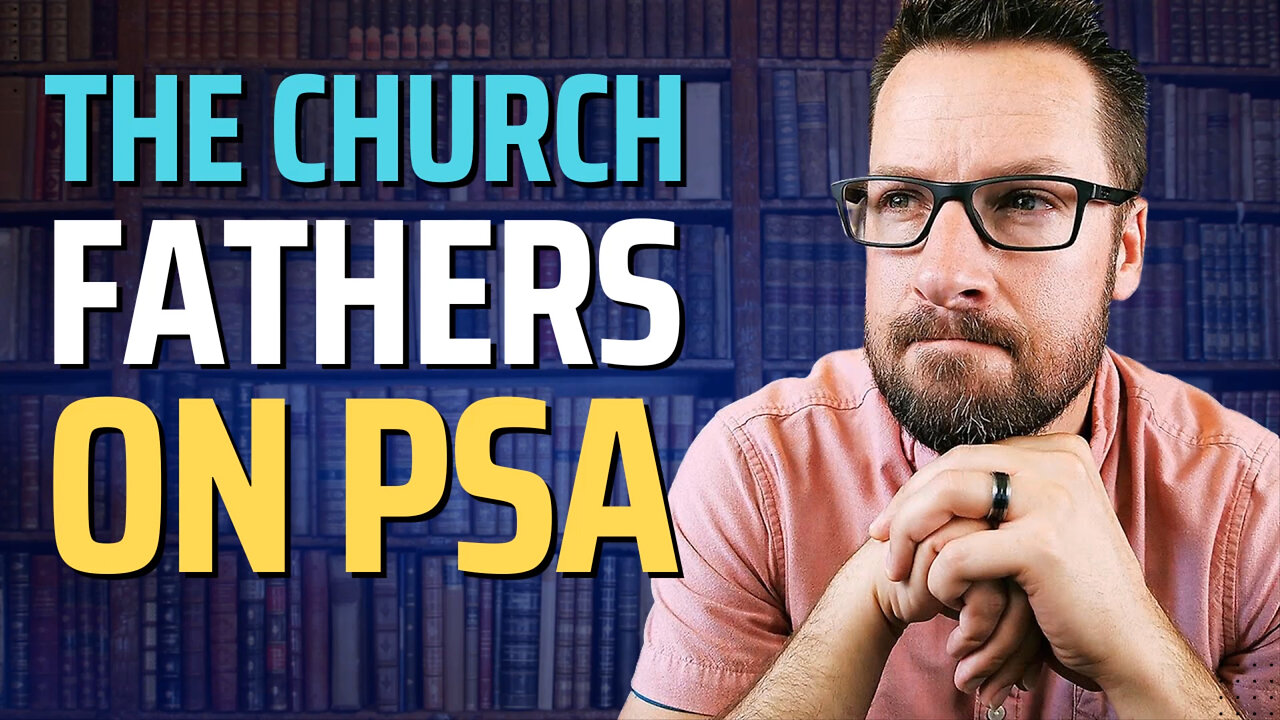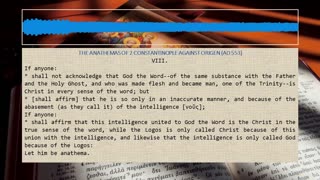Premium Only Content

Mike Winger Critique Episode 3: Did Athanasius Teach PSA?
In response to Mike Winger’s claim that the Church Fathers taught penal-substitutionary atonement (PSA), Idol Killer host Warren McGrew and his guest Paul Vendredi argue that the Eastern Orthodox Church, which heavily relies on these church fathers, does not teach PSA. To support their argument, they examine Athanasius, one of the cited church fathers, and suggest that Winger may be bringing a modern bias into the interpretation of these ancient texts.
Paul refutes the Protestant apologists' claim that Protestantism represents the true teachings of Christ, despite its origin being over 1,500 years after Christ's birth. To defend this claim, Protestant apologists jump onto the timeline at 1517 and look backward, plundering intellectual history for figures they can label as proto-Protestants. One such figure is Thomas Aquinas, who is described as a Protestant-leaning figure due to his rejection of certain Catholic dogmas like the Immaculate Conception. The Protestant strategy continues as they label other figures, like Athanasius, as proto-Protestants despite the historical context and the figures' original religious affiliations.
Paul momentarily digresses on how technology has impacted the field of apologetics and the ability to fact-check information. He reminisces about the era of audiotapes and how apologists could lie without consequences, as audiences did not have the means to fact-check on the spot. However, with the advancement of technology and the availability of information online, the “Apologetics Industrial Complex” has been forced to be more honest. Paul also reflects on how technology has enabled easier access to the Church Fathers' works and facilitated dialogue within Christianity.
Paul then contrasts the understanding of the crucifixion, asserted by Calvinists Wayne Grudem and Alex Metherell, with that of Athanasius in his book “On the Incarnation.” In this text, Athanasius compares Jesus to a wrestler who must face and overcome the top contenders and must triumph over a public and painful death, to prove his strength and worth. According to Athanasius, Jesus had to die in a public and visible way to remove any doubt about the authenticity of his resurrection. Additionally, Jesus had to defeat an ignominious death to prove his divine power. Athanasius believed that Satan, the prince of the power of the air, was the enemy trying to keep souls from the truth and hindering those who follow it. By dying on the cross, Jesus overthrew Satan and purified the air, making a way for humans to ascend to heaven. Furthermore, Athanasius saw Jesus' crucifixion as an icon of human unity and indivisibility. Jesus' arms outstretched on the cross symbolized his drawing all men unto himself, and his undivided body in death prevented any excuse for dividing the church in the future. Therefore, Athanasius did not view Jesus' crucifixion as a penal-substitutionary atonement, but rather as a demonstration of his divinity, his victory over Satan, and the unity and indivisibility of the church.
RC Sproul's description of Jesus on the cross as the "quintessential obscenity" is disputed by the hosts. They find it offensive and unbiblical, as they believe the Father and Son have perfect communion throughout the crucifixion. Indeed, the PSA model creates division within the Trinity.
-
 1:37
1:37
Paul Vendredi
3 months ago2 Constantinople - Anathemas 8-9
141 -
 1:20:15
1:20:15
vivafrei
2 hours agoRFK Jr. Takes on the Pharma WHOORES! Toddler-Assaulter Granted BAIL? COMPLYE WITH CRIMINALS! & more
76.6K24 -
 LIVE
LIVE
LadyDesireeMusic
1 hour agoLive Piano Request - Anti Brain Rot - Support Culture Shift
146 watching -
 LIVE
LIVE
The HotSeat
1 hour agoTrump’s Parade = Mocked, China’s Parade = Praised: Leftist Hypocrisy EXPOSED
629 watching -
 1:57:29
1:57:29
The Quartering
3 hours agoRFK Jr Goes NUCLEAR, Horrible Tomb Raider News, Anti-White Male Propaganda
84.1K17 -
 LIVE
LIVE
Dr Disrespect
5 hours ago🔴LIVE: Hell Is Us Launch - DR DISRESPECT’s First Look at the Scariest Game of 2025!
1,234 watching -
 LIVE
LIVE
Pop Culture Crisis
2 hours agoSabrina Carpenter Wants Feminist Approval, Demonic Rituals at Burning Man? | Ep. 910
341 watching -
 11:17
11:17
Dr. Nick Zyrowski
29 days agoTop 10 No CARB No SUGAR Foods That Will Change Your Health
22.3K4 -
 LIVE
LIVE
Chrissie Mayr
2 days agoChrissie Mayr's Content Hotel at The Villa Roma! Anthony Cumia, Dave Landau, Violet
75 watching -
![[Ep 741] RFK Jr. Hits Back at Rabid Dems | Portland Antifa Terrorists | The Evil That is the Left](https://1a-1791.com/video/fww1/bb/s8/1/W/U/c/f/WUcfz.0kob-small-Ep-741-RFK-Jr.-Hits-Back-at.jpg) LIVE
LIVE
The Nunn Report - w/ Dan Nunn
1 hour ago[Ep 741] RFK Jr. Hits Back at Rabid Dems | Portland Antifa Terrorists | The Evil That is the Left
174 watching